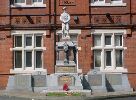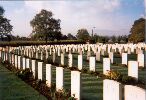
Newton-le-Willows and
Earlestown War Memorial

| OTHER WARS |
 |
Newton-le-Willows andEarlestown War Memorial |
 |
| The
Great War Roll of Honour |
|||||||||||||||||||||||||
Evelyn lived with his wife, Minnie, and their three children, Nancy Craven, William John and Clifford, at 1, Mount Tabor, Lowton. The address given when Evelyn joined the army on 11th December 1915 was 28, Ingham Road, Liverpool, but this was changed on his attestation papers, which are available at the PRO as part of the "Burnt Documents". His attestation gives their marriage as May 1912 with Nancy's birth as March of the same year. Confusingly, there is a letter also in the papers stating that ".. Annie Craven Darrock was born out of wedlock, but has always been maintained by the late No. 57128 Private Craven prior to enlistment, and considered to be a member of his family." William John was born in May 1913 and Clifford in May 1915.
On a receipt dated December 1920, Minnie signed herself as "M Ellwood nee M Craven" and gave her address as 25, Sobley Buildings, Carlinghow, Batley, Yorkshire. She was originally awarded a pension of twenty nine shillings and sevenpence for herself and her three children.
Evelyn's father-in-law was a former stationmaster at Newton-le-Willows. According to SDGW, Evelyn was born in Flint. As a boy, he attended St. Peter’s School, Newton, and was in the Church choir.
He used to work for Messrs. McCorquodale’s Printing Works, Newton, but when he enlisted he was a traveller for a Liverpool firm. He was originally with the 3rd Batallion, South Lancashire Regiment (40902) but transferred to the Cheshire Regiment, the 16th having originally been raised as a ‘Bantam Battalion’ for shorter men. However, his height was 5 feet 7 1/2 inches, so was not short by the standards of the time. He was in the Army Reserve for December 1915 until mobilised on 15th June 1917. He was transferred to the Cheshire Regiment and posted to France on 24th October 1917, only a month before his death.
Evelyn is buried in Minty Farm Cemetery, Langemark-Poelkapelle, north of Ypres, in Plot II Row D Grave 7. According to CWGC, the farm was used a German blockhouse, and in 1917 as a British Company Headquarters; the name is probably due to its occupation by a Wiltshire unit. The cemetery was begun in October 1917 and used until April 1918. There are nearly 200 First World War casualties commemorated on the site.
There are no details in the obituary published in the NEG on 14th December 1917 as to when Evelyn sustained the wounds from which he died. However, he died at the end of the Third Battle of Ypres, usually called Passchendaele, which officially ended on the 10th November.
According to “Passchendaele: The Day-By-Day Account” by Chris McCarthy,
which he based on the Official History accounts, members of the 35th Division,
of which the 16th Cheshires were a part, took up the line Aden House-Les Cinq
Chemins on the 20th October. He then continues with the last action recorded
for the Division in his book:
“Monday 22 October. Temperature 56°F, overcast. Rainfall: 3.2 mm.
The 35th Division (XIV Corps) attacked with two brigades at 5.35 a.m.
(account of the attack by the 104 Brigade)
“105 Brigade attacked with the 16th Cheshires and the 14th Gloucestershires;
the 15th Sherwood Foresters were in support and the 15th Cheshires in reserve.
The right of the 16th Cheshires went well and gained its objective, Marechal
Farm, with few problems. However the centre and left were held up by fire from
a blockhouse in the wood, 500 yards north-west of Columbo House. The line was
consolidated at this point….
"At 4.39 p.m. the Germans launched a counter-attack against the left of
the 16th Cheshires and broke through. The surviving Cheshires fell back 100
yards, and then back to their original line. The 14th Gloucesters remained on
the original objective and the German attack was caught by artillery fire, but
the right of the Gloucesters dropped back and made a defensive flank with the
Cheshires. A platoon of the 15th Sherwood Foresters was brought up to bridge
the gap.”
It is unlikely that Evelyn took part in this action however as he was still
being transferred to the regiment, as mentioned above.